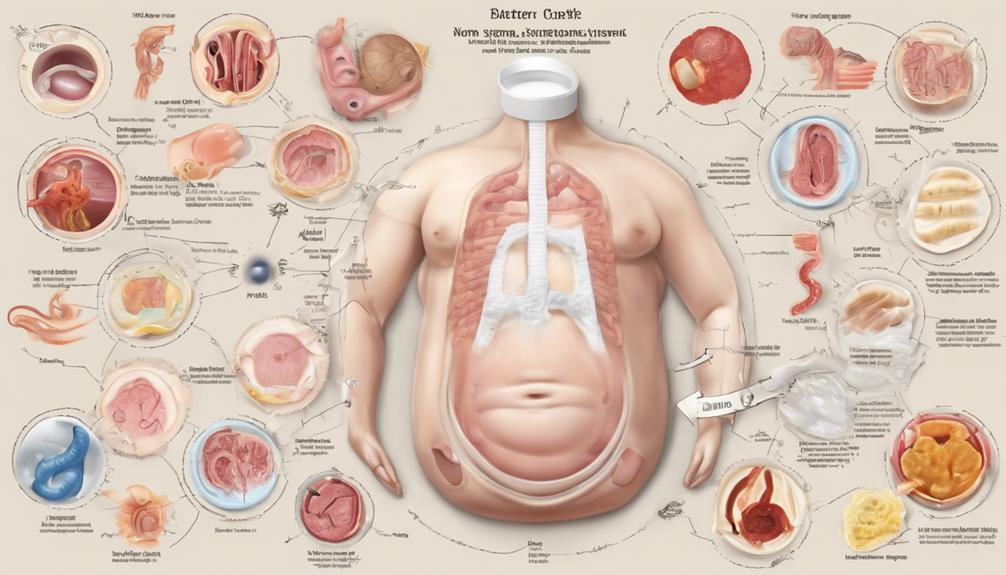When developing a well-rounded care plan for newborns, we set the foundation for providing top-notch care to our infants. This structured method of meeting their needs guarantees a smooth transition into the new journey of parenthood.
But what happens when unexpected challenges arise, throwing our carefully crafted plans into disarray? Join us as we explore strategies for adapting and fine-tuning our care plans to meet the evolving needs of our newborns, creating a nurturing environment that fosters their healthy growth and development.
Key Takeaways
- Tailored care plans optimize newborn well-being.
- Personalized routines foster individualized attention.
- Regular monitoring ensures effective care adjustments.
- Collaboration with healthcare providers enhances care quality.
Importance of Newborn Care Plans
Understanding the importance of newborn care plans is essential for ensuring the well-being and development of the newborn right from the start. Nursing care plans help us tailor our care to the specific needs of the newborn.
By following structured feeding schedules, monitoring sleep patterns, practicing good hygiene, and tracking developmental milestones, we can provide the best possible care. These care plans empower us with the knowledge and tools needed to establish consistent routines that promote the newborn's health.
Care plans also assist in creating a nurturing environment that fosters growth and development.
Essential Components for Newborn Care

When creating a newborn care plan, it is important to include essential components such as feeding schedules, sleep patterns, hygiene practices, and monitoring developmental milestones. These elements are crucial for ensuring the well-being and healthy development of newborns. By focusing on growth monitoring, addressing concerns promptly, and empowering caregivers with knowledge, we can provide the best possible care for each individual baby. Personalized approaches are key in crafting tailored care plans that meet the unique needs of every newborn.
| Components | Importance |
|---|---|
| Feeding Schedules | Support healthy growth and development |
| Sleep Patterns | Essential for overall well-being and health |
| Hygiene Practices | Promote cleanliness and prevent infections |
| Developmental Milestones | Monitor progress and early identification of issues |
Personalizing Your Newborn Care Plan
Crafting a personalized newborn care plan involves tailoring specific aspects like feeding schedules, sleep patterns, hygiene practices, and developmental milestones to cater to the unique needs of each individual newborn. By personalizing the care plan, we can customize care routines based on the newborn's health status, growth patterns, and any specific concerns that may arise. This tailored approach empowers caregivers to provide individualized attention, support, and monitoring to make sure the newborn's well-being is prioritized.
When personalizing a newborn care plan, it's important to take into account the infant's health status, growth patterns, and any specific concerns or conditions they may have. By incorporating these details into the care plan, we can address the individual needs of each newborn effectively. This personalized care plan not only promotes ideal health and development but also fosters a strong foundation for the newborn's future well-being. Providing individualized attention tailored to the unique characteristics of each newborn ensures that their care plan is thorough and meets their specific requirements.
Monitoring and Adjusting Your Care Plan

Regularly evaluating and adjusting the newborn care plan is important to guarantee the best care and support for the baby's evolving needs. Here are some key steps to effectively monitor and make adjustments to the care plan:
- Monitor the Baby's Progress: Keep a close eye on the baby's physical development, growth, and overall health to identify any areas of concern or changes that may require adjustments to the care plan.
- Assess the Effectiveness of Interventions: Regularly assess whether the interventions outlined in the care plan are achieving the desired outcomes and making necessary changes if they aren't yielding the expected results.
- Consult Healthcare Providers and Caregivers: Seek input from healthcare providers and caregivers when considering adjustments to the care plan to ensure a thorough and well-rounded approach to the baby's care.
- Optimize Care Delivery: Consistently track the baby's responses to the care plan and be prepared to make modifications as needed to optimize the delivery of care and support.
Sharing Your Care Plan With Healthcare Providers
To guarantee thorough and coordinated care for your newborn, sharing the care plan with healthcare providers is essential. By providing healthcare providers with a detailed nursing care plan template, they can gain insights into your newborn's specific needs, milestones, and potential concerns. This shared information enables healthcare providers to offer guidance, support, and tailored interventions that align with the care plan, promoting a holistic approach to your newborn's health.
Regular updates and open communication with healthcare providers based on the care plan are critical. This ongoing dialogue allows for tracking progress, addressing any emerging issues promptly, and making necessary adjustments to the care plan as needed. Collaborating with healthcare providers not only enhances the overall quality of care but also ensures that all involved parties are working together towards the common goal of your newborn's well-being. By sharing your care plan, you empower healthcare providers to deliver the best possible care for your newborn.
Frequently Asked Questions
How Do You Write a Comprehensive Care Plan?
We write a thorough care plan by gathering detailed health information, setting specific goals, developing a structured plan, including interventions, and regularly evaluating and adjusting the plan. This guarantees we meet evolving needs and promote top-notch health outcomes for newborns.
What Is Comprehensive Care of the Newborn?
Thorough care of the newborn encompasses monitoring growth, ensuring proper feeding, promoting bonding, and addressing health concerns. It focuses on creating a nurturing environment, establishing routines, and educating caregivers to support the newborn's best health and growth.
What Are the Components of a Comprehensive Care Plan?
We acknowledge the significance of a thorough care plan. It encompasses feeding schedules, sleep patterns, hygiene practices, and developmental milestones. Our emphasis is on newborn stability, successful change, respiratory function, cardiovascular health, and thermoregulation.
What Are the 4 Components of Essential Newborn Care?
Maintaining a newborn's body temperature, ensuring cleanliness, caring for the umbilical cord, and promoting early and exclusive breastfeeding are vital components of essential newborn care. These practices support the baby's health and well-being.
Conclusion
To guarantee a thorough newborn care plan is absolutely crucial for the well-being and development of our little ones. By following this structured guide, we can make sure that every aspect of their care is covered, from feeding to sleep and everything in between.
So, let's not underestimate the power of a well-thought-out care plan – it truly lays the foundation for a healthy and thriving start in life for our precious newborns.










